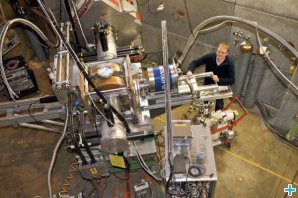Using muons for research
The muon
Muons are electrically charged elementary particles. Particle physicists regard muons as heavy electrons – they have basically the same physical properties as electrons except for their mass being 207 times larger. There are both positively (µ+) and negatively (µ-) charged muons. Muons are unstable particles and decay with a half-life of a few millionths of a second. Since they only live such a short time, muons are not a component part of matter. And yet they are also found naturally in our world, as they are part of of cosmic background radiation and rain down on us all the time from high up in the earth’s atmosphere.
Muons as probes
We use muons to study how substances behave at the very small scale – the world of atoms and molecules (groups of atoms). When a new substance is made, it will sometimes have useful properties – maybe it is extra hard, or conducts electricity in new ways, or has unusual magnetic properties. To understand why the substance behaves as it does, we need to know what its atoms are doing.
It’s hard to see the atoms directly – but we can send in a ‘spy’ – something to get a look at the atoms and tell us what is going on. This is the job of the muon. We send muons into substances, and they see what the atoms are doing and tell us. Muons are very useful for this!
Muons have applications across a very broad range of areas. We can use them for studying magnetism, superconductivity, diffusion and charge transport, chemical reactions and molecular dynamics. In many of these areas, they give us complementary information to other techniques such as neutron scattering. Find out more about what can be studied with neutrons.
Muons can also be thought of as light protons, and studies of their behaviour inside substances can shed light on hydrogen behaviour in technologically relevant semiconductors and hydrogen storage materials.
The technique of using muons for condensed matter studies is called µSR: muon spin rotation, relaxation and resonance – or just muon spin research.
In these pages you will find information about muons and what can be studied using muons, as well as information about facilities where muons can be used for research.

